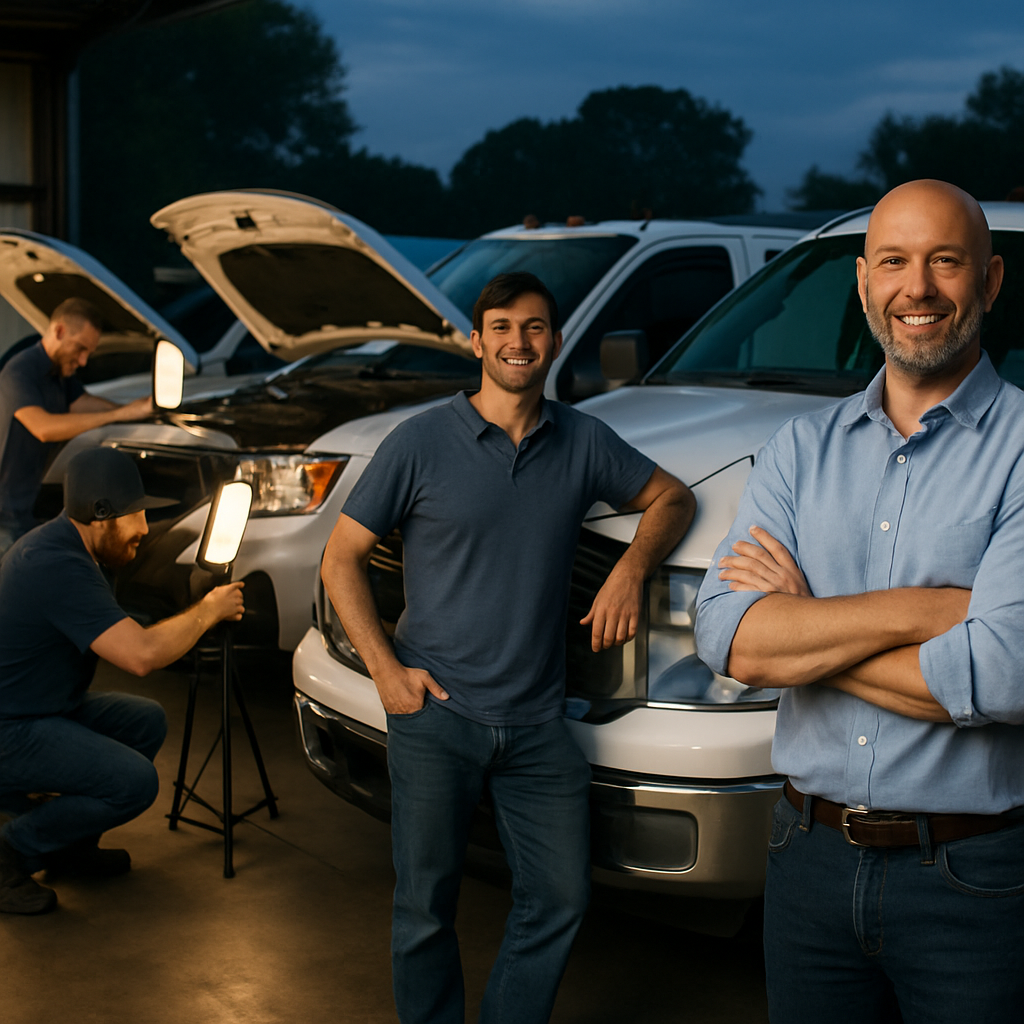Fleet Physical Damage Coverage: Protects Your Business Vehicles From Accidents, Vandalism, and More
Operating a fleet means constant risk—collisions, hail, theft, and unexpected damage can disrupt your business. This coverage helps keep your vehicles on the road and your operations moving when accidents happen.

Real Situations Where Fleet Physical Damage Coverage Helps
Real scenarios that show exactly when and how Fleet Physical Damage Coverage protects your business vehicles.

Delivery Van Dented in a Loading Dock
Mike manages a small cleaning company with several vans. One morning, a driver scraped a van against the corner of a busy loading dock, leaving a long dent and smashed taillight. Fleet Physical Damage Coverage responded immediately, taking care of the $1,600 repair bill. Instead of disrupting multiple routes or paying out of pocket, Mike's company paid their $500 deductible and the van was back in service that week.

Severe Hail Damages Work Trucks
Lisa's landscaping company owns five trucks. After a sudden spring hailstorm, all trucks suffered window and body damage. Fleet Physical Damage Coverage handled the claim, covering over $15,000 in repairs across the fleet. Instead of weeks lost to downtime, Lisa coordinated repairs quickly and her crews were back on the job, minimizing lost revenue and delays.

Theft of a Key Commercial Vehicle Overnight
Tomas manages a courier company. One of their delivery vans was stolen overnight from a secured lot. Fleet Physical Damage Coverage paid the vehicle's actual cash value—over $28,000—minus the deductible, allowing Tomas to quickly replace the van and keep his contracts intact. Instead of catastrophic interruption, business continued smoothly thanks to proper protection.
Everything You Need to Know About Fleet Physical Damage Coverage
The complete picture: what's covered, what's not, and how to decide if you need it.
Fleet Physical Damage Coverage (Plain English)
Fleet Physical Damage Coverage helps repair or replace your business vehicles after events like accidents, theft, fire, vandalism, or severe weather. When your company vehicle is damaged or stolen, this coverage pays for repairs or the current value of the vehicle. The key thing to understand is that it protects your investment in the vehicles that keep your business moving.
Important Details
You'll pay a deductible (often $500–$1,000) per claim. Most policies limit payouts to the vehicle's Actual Cash Value (ACV), which factors in depreciation. Each vehicle must be listed on your policy. Optional coverages, like replacement cost for newer vehicles or rental reimbursement, may be available. Claims are only paid for events specifically listed in your policy, so it's important to review exclusions with your advisor.
Fleet Physical Damage Coverage vs. Other Coverages
Fleet Physical Damage Coverage is NOT the same as Liability Insurance or standard Auto Insurance. Physical Damage Coverage pays for repairs to your own vehicles, while liability insurance covers injuries or damage you cause to others. You typically need both to be fully protected.
Who Needs Fleet Physical Damage Coverage?
You typically need this coverage if:
- You are a business owner with multiple company vehicles (delivery, service, transport)
- Your vehicles are essential to your operations and income
You might skip this coverage if:
- Your vehicles are older, low value, or easily replaced
Coverage Amounts & Options
Coverage limits are usually set at each vehicle's actual cash value. You choose your deductible amount—higher deductibles lower your premium, but you'll pay more out of pocket per claim. Optional add-ons can include rental reimbursement and gap coverage for financed vehicles. Review available options with your advisor to tailor coverage for your fleet's needs.
What's NOT Covered by Fleet Physical Damage
This coverage does NOT cover:
- Wear and tear or mechanical breakdown: Ordinary maintenance, engine failure, or tire wear
- Personal items in the vehicles: Tools, equipment, or personal belongings are not covered under vehicle damage
For these situations, you'd need equipment coverage or a separate auto service policy.
See Your Price with Fleet Physical Damage Coverage
Now that you understand Fleet Physical Damage Coverage, see how affordable protection can be with personalized quotes from 26+ carriers.

Experience You Can Trust
1,430+ business owners trust our expertise to explain coverage clearly and find the right fleet protection for their companies.
4.9/5 Stars
Google Reviews from real customers, just like you
97% Retention
Customers stay with us year over year over year
Independent
We work for you, not insurance companies
Local
Fort Collins owned & operated since 1992
How Fleet Physical Damage Coverage Actually Works
Understanding exactly what happens when you file a fleet physical damage claim—from incident to resolution.
The Claims Process
- Report the Incident: Contact your insurance advisor or carrier promptly after damage, theft, or other covered incidents. Provide details for fast processing and receive a claim number.
- Assessment & Documentation: An adjuster will review the vehicle's damage—either on-site or via photos—to verify it falls under covered events and to estimate repair costs or cash value.
- Repair or Replacement: Take your vehicle to a trusted repair shop, or arrange for a replacement if it is totaled or stolen. The insurer coordinates payment (minus your deductible) directly with the repair provider or releases funds for a replacement vehicle.
- Get Back to Business: Once repairs are complete or your new vehicle is secured, you return to normal operations. Your advisor will help with any follow-ups and reviewing lessons learned for future prevention.
What You Pay
Your deductible—typically $500–$1,000 per vehicle per claim—is deducted from any payout. Your premium covers your entire fleet, spreading out costs. Choosing a higher deductible lowers premiums, but make sure your business can afford that outlay if something happens.
Timeline
Simple fleet claims (like a single-vehicle repair) often resolve within one to two weeks. More complex claims—such as severe weather losses across several vehicles, or vehicle thefts—may take two to four weeks or longer if replacement vehicles are needed. Most businesses find the process straightforward, especially with prompt reporting and professional repair partners. The key is prompt reporting—the faster you contact your advisor, the quicker you can resolve and minimize downtime.
What Fleet Physical Damage Coverage Actually Costs vs. What You Risk
Understanding the real financial impact: what you pay for coverage vs. what you risk without it.
Minor Accident
Annual Coverage Cost: $900 per vehicle
Scenario: Delivery van backs into a loading dock, needing $2,500 in repairs
Without Coverage: $2,500 out of pocket
With Coverage: $500 deductible (plus your annual premium)
Protection Value: $2,000 saved just in this scenario
Severe Weather Event
Annual Coverage Cost: $900 per vehicle
Scenario: Hail damages a fleet of 5 trucks, causing $16,000 in total repairs
Without Coverage: $16,000 out of pocket
With Coverage: $1,000 deductible per truck (assuming 5 claims)
Protection Value: Over $11,000 saved for the business
Vehicle Theft or Total Loss
Annual Coverage Cost: $900 per vehicle
Scenario: New $30,000 delivery van stolen
Without Coverage: Entire $30,000 lost
With Coverage: $1,000 deductible (plus annual premium)
Protection Value: $29,000 returned to your business
The Economic Reality
For most businesses, Fleet Physical Damage Coverage costs under $80 per vehicle per month—similar to a monthly cell phone plan. One significant incident could cost $5,000–$30,000 or more, which might take months or longer to recover financially. The math is simple: this coverage pays for itself the first time you need it—and could save your business from major disruption after a serious loss.
4 Costly Fleet Physical Damage Coverage Mistakes to Avoid
Learn from others' mistakes—avoid these common errors that can leave your vehicles and business exposed when you need protection most.
Underinsuring Fleet Value
Some business owners list outdated or low values for their vehicles to lower premiums. This leads to reduced claim payouts—leaving gaps when you need repairs or replacements. Instead, regularly update vehicle values and inventories to make sure you're properly protected.
Choosing a Deductible That's Too High
Picking a very high deductible can save money on premiums. But if you can't cover it, your repairs get delayed and business suffers. Choose a deductible that fits your company's cash flow and savings strategy.
Assuming Personal Auto Policies Cover Your Fleet
Using personal or generic auto policies for work vehicles is tempting, but these often exclude business use or multiple vehicles. Make sure your fleet has dedicated commercial coverage for all vehicles and drivers.
Ignoring Exclusions and Maintenance Requirements
Skipping the fine print or regular maintenance can result in denied claims—worn brakes or engine issues aren't covered. Keep detailed maintenance records and know what's excluded so there are no surprises when making a claim.
Find answers to your most pressing insurance questions right here.
Explore Your Coverage Options
Discover the best insurance coverage tailored to your individual needs and protect what matters most.

